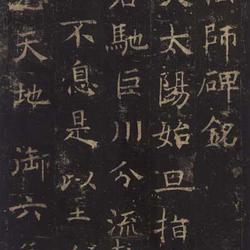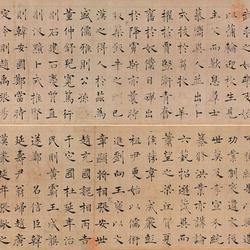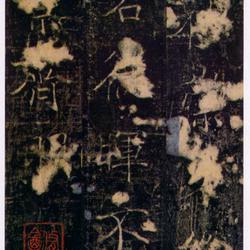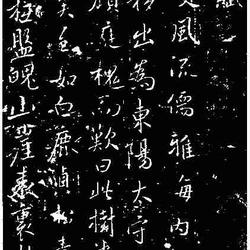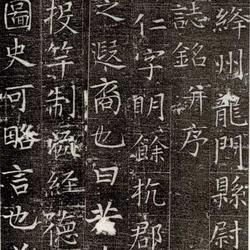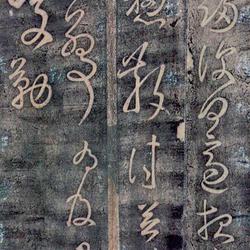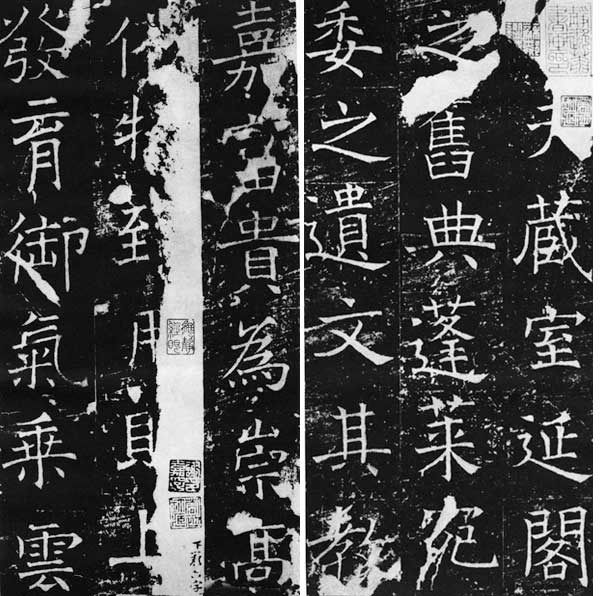
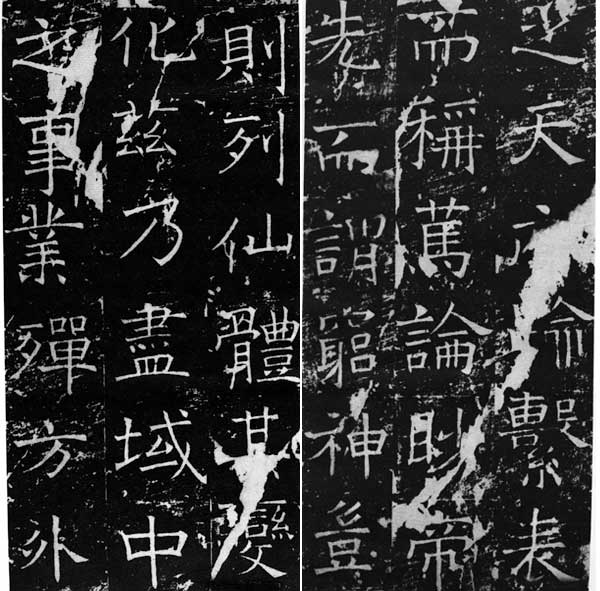
Rubbings from Yique Buddhist niche (partial part) collected by Beijing Library
"Yique Buddhist Niche Stele" was written by Tang Cenwen and written by Chu Suiliang. It was established in the fifteenth year of Zhenguan of Tang Dynasty. Regular script. This monument is carved on a cliff. His structure is both powerful and graceful, his writing force is strong, dignified and majestic, and his charm is broad and profound. It is very different from the changeable and graceful calligraphy of his later years.
Reminder:
Liu Xizai of the Qing Dynasty: "Yique Buddhist Niche Stele" written by Chu, which is based on Ou and Yu's Sheng, was drafted in "Ci'en" and "Shengjiao". However, although Wang's book is meticulous and flowing, it is ultimately less elegant. ("Art Concept")
Liang Dynasty, Qing Dynasty: Chu Henan wrote "The Three Niches of Longmen", a middle-aged pen, upright and strong, written by Ouyang, with eight points of reference, and the inscription on the stele is particularly good. ("Pingshu Tie")
Yang Shoujing of the Qing Dynasty: The style is straight and broad, and the greatness is there. It is not a strange thing. It still follows the old style of the Chen and Sui Dynasties. In his later years, he strived to change his ears. I also know that the graceful Chanjuan wants this realm first. ("Ping Stele Record")
Biography of calligrapher:
Chu Suiliang, courtesy name Dengshan, was born in Qiantang, Hangzhou. Tongzhi Sanqi often serves Liangzi. At the end of the Sui Dynasty, he gave up his life for Xue Ju. Ren Gaoping was awarded the title of Kai Cao of the Prince of Qin to join the army. In Zhenguan, he moved to be a living man. He is knowledgeable in literature and history, and works in regular script. Taizong sighed and said: "Yu Shinan died, and there is no one to comment on the book!" Wei Zhengbai saw Suiliang, and the emperor ordered him to serve on the book. Emperor Fang Bo Wang Xi's posthumous post has been widely scrutinized all over the world, but no one can verify its authenticity. There is nothing wrong with what Suiliang wrote. In the fifteenth year, he moved to advise the officials and also knew about daily life.
At that time, many flying pheasants gathered in the palace, and the emperor asked: "What auspiciousness is this?" Suiliang said that Qin Wengong got the female and then the male princes, and Han Guangwu got the male from all over the world. Now the male and female can be seen together to express Mingde. Emperor Yue said: "One cannot stand up without learning. Suiliang's so-called knowledgeable gentleman is a gentleman!" He granted the title of guest to the prince. He joined Huangmen as a minister and participated in the government affairs. The father's death was spared, and he came back to worship Zhongshu Ling.
When the emperor fell ill, he summoned Suiliang and his eldest grandson Wuji and said, "Emperor Wu of the Han Dynasty sent Huo Guang, and Liu Bei entrusted Zhuge Liang. I am entrusting you now. The prince is benevolent and filial, and he has sincerely assisted him." He called the prince and said, "Wuji, Suiliang is here, and Don't worry." Because of his fate, he issued an edict. After Emperor Gaozong ascended the throne, he was granted the title of County Duke of Henan and became the Duke of the County. The incident came out as the assassination history of Tongzhou. At the next year, he was summoned to pay homage to the Minister of Civil Affairs and the third rank of Tongzhongshu, who supervised the compilation of the history of the country and was also a guest of the prince. Go in and pay homage to Shangshu's right servant. Due to the remonstrance, Wu Zhaoyi was established, and when the Wu family was established, he moved to the left to be the governor of Tanzhou in Suiliang. In the second year of Xianqing's reign, he moved to Guizhou. Soon after, he was demoted to Aizhou as the assassin. Suiliang was worried about internal disasters and was afraid that he would not be able to find out the truth after his death, so he confessed to the emperor that the emperor was cowardly and was tied to Empress Wu, who eventually became unconscious. He died at the age of sixty-three. In ancient times, it was said that those who could not be taken away during important festivals were the Duke of Chu.

